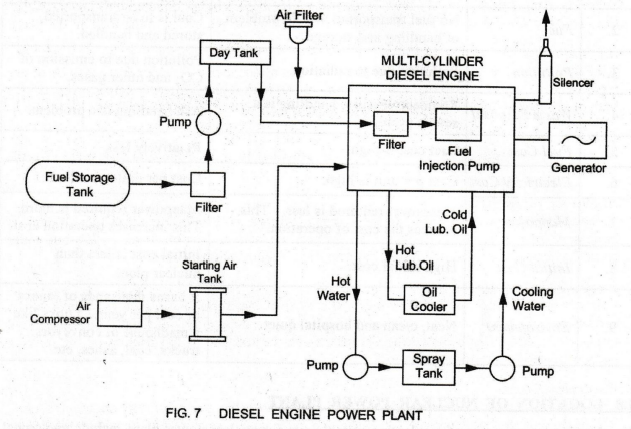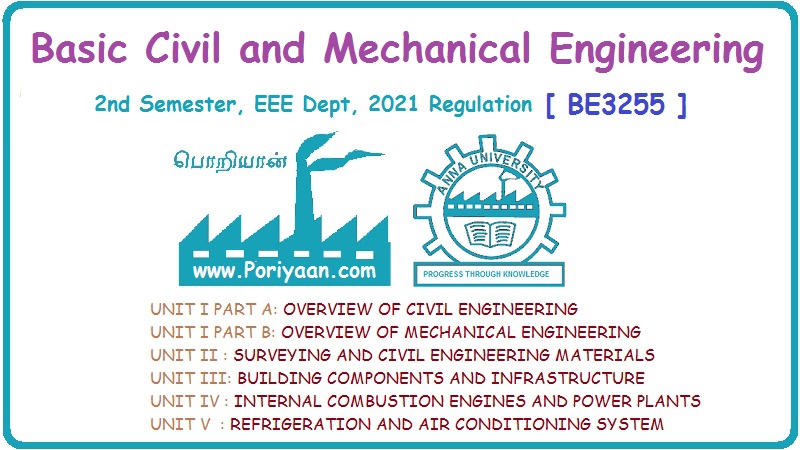Basic Civil & Mechanical Engineering: UNIT IV: a. Power plants
Diesel engine power plant
Working Principle, Layout Diagram, Advantages, Disadvantages, Applications
The Diesel Power Plant is a fossil-fuel plant, since diesel is a fossil-fuel.
DIESEL ENGINE POWER PLANT
The
Diesel Power Plant is a fossil-fuel plant, since diesel is a fossil-fuel.
1. LAYOUT OF DIESEL ENGINE POWER PLANT (Fig. 7)

1.
Diesel Engine: (Refer Chapter 11 - Internal Combustion
Engines)
Diesel
Engine is also known as Compression Ignition Engine. It is classified as Two
Stroke Engine and Four Stroke Engine. According to the number of cylinders,
diesel engines are classified as Single Cylinder and Multi-cylinder Engines.
Diesel Engines may have more than one cylinder such as 4, 6, 8, etc. Normally,
multi-cylinder two stroke diesel engines are used in diesel power plants.
See
Fig. 7, showing the layout of a Diesel Power Plant. In the diesel engine, air
admitted into the cylinder is compressed. The compression ratio is 12 to 20.
At
the end of the compression stroke, the fuel (diesel) is injected. It burns and
the burning gases expand and do work on the piston. The engine is directly
coupled to the electric generator. The gases are then exhausted from the
cylinder to the atmosphere.
2.
Engine Starting System
This
includes Air Compressor and Starting Air Tank. The function of this system is
to start the engine from cold by supplying compressed air.
3.
Fuel System
Pump
draws diesel from the Fuel Storage Tank and supplies it to the small Day Tank
through the Filter. Day tank supplies the daily-fuel-need of the engine. The
day tank is usually placed high so that diesel flows to engine under gravity.
Diesel is again filtered in the Filter inside the engine before being injected
into the engine by the Fuel Injection Pump. The fuel is supplied to the engine
according to the load on the plant.
4.
Air Intake System
Air
Filter is used to remove dust from the incoming atmospheric air. Air filter may
be of dry type, which is made up of felt, wool or cloth. In oil bath type of
filter, the air is swept over a bath of oil so that dust particles get coated.
5.
Exhaust System
In
the exhaust system, Silencer (Muffler) is provided to reduce the noise produced
by the engine.
6.
Engine Cooling System
Temperature
of burning gases in the engine cylinder is 1500°C to 2000°C. Water is
circulated inside the engine to keep the temperature at a reasonable level. The
hot water from the engine is cooled in a Spray Tank and re-circulated using
Pump.
7.
Engine Lubricating System
Lubrication
is essential to reduce friction and wear of the engine parts such as cylinder
walls and piston. Engine Lubricating System includes Lubricating Oil Cooler and
Oil Pump. [Oil pump is not shown.] Lubricating oil which gets heated due to the
friction of the moving parts is cooled before re-circulation.
8.
Governing System
The
function of the governing system is to maintain the speed of the engine
constant, irrespective of load on the plant. This is done generally by varying
fuel supply to the engine according to the load.
2. ADVANTAGES OF DIESEL ENGINE POWER PLANT
1.
Plant Layout: Plant layout is simple. Hence, it can be
quickly installed and commissioned, while the erection and starting of a steam
power plant or hydro-plant takes a fairly long time.
2.
Quick Starting: Quick starting and easy pick-up of
loads are possible in a very short time.
3.
Location: Location of the plant is near the load center.
4.
Plant Operation: The plant operation is easy and
requires minimum labour.
5.
Part Load: Efficiency at part loads does not fall so much as
that of a steam plant.
6.
Varying Load: It can respond to varying loads without
any difficulty.
7.
Fuel Handling: Fuel handling is easier and no problem
of ash disposal exists.
8.
Size: The plant is smaller in size than steam power plant
for the same capacity.
9.
Space Required: The space required for diesel plant is
considerably less than thermal plant. Therefore, cost of foundation and
building is less.
10.
High Overall Efficiency: Diesel plants operate at high
overall efficiency than steam plants.
11.
No Skilled Labours: Skilled labours are not required.
12.
Reliability in Operation: Diesel plant is more reliable
compared to other plants.
3. DISADVANTAGES OF DIESEL ENGINE POWER PLANT
1.
Plant Capacity: Plant capacity is limited to about 50
MW of power.
2.
Expensive Fuel: Diesel fuel is much more expensive than
coal.
3.
Maintenance Cost: The maintenance and lubrication costs
are high.
4.
Overloading: Diesel engines are not guaranteed for
operation under continuous overloads, while steam turbines can work under 25%
of overload continuously.
5.
Noise Pollution: The noise is a serious problem in
diesel plants.
6.
Life: Life of the diesel plant is less when compared to
thermal plant.
4. APPLICATIONS
1.
Small and Medium Capacity: Diesel power plants in the range
of 2 to 50 MW capacity are used as central stations for small or medium power
supplies.
2.
Standby Plants: They can be used as standby plants to
hydro-electric power plants. If the water available is not sufficient due to
reduced rain fall, a diesel station supplies power in parallel with
hydro-station. The use is made temporarily till the water is available to take
the full load.
3.
Emergency Plants: The plants used for emergency purposes
are also standby units, normally idle. But, they are used where power
interruption would mean financial loss or danger in key industrial processes,
tunnel lighting and operation theatres of hospitals. They are also used for
telecommunication and water supply under emergency conditions.
4.
Peak Load Plants: They can be used as peak load plants in
combination with thermal or hydro-plants.
5.
Mobile Power Generation: They are quite suitable for
mobile power generation. They are used where electric line service is
unavailable. They are widely used in transportation systems such as
automobiles, railways, air planes and ships.
6.
Diesel-Generating Set: Nowadays, power cut has become a
regular feature for industries. The only solution to tide over this difficulty
is to install diesel-generating sets. Small supply units for commercial
purposes and public utilities, viz., cinema hall, hospital, shopping complex,
etc., are commonly used in practice.
7.
Starting Station: The diesel plants are used to run the
auxiliaries for starting the large steam plants.
Basic Civil & Mechanical Engineering: UNIT IV: a. Power plants : Tag: : Working Principle, Layout Diagram, Advantages, Disadvantages, Applications - Diesel engine power plant
Related Topics
Related Subjects
Basic Civil and Mechanical Engineering
BE3255 2nd Semester 2021 Regulation | 2nd Semester EEE Dept 2021 Regulation
